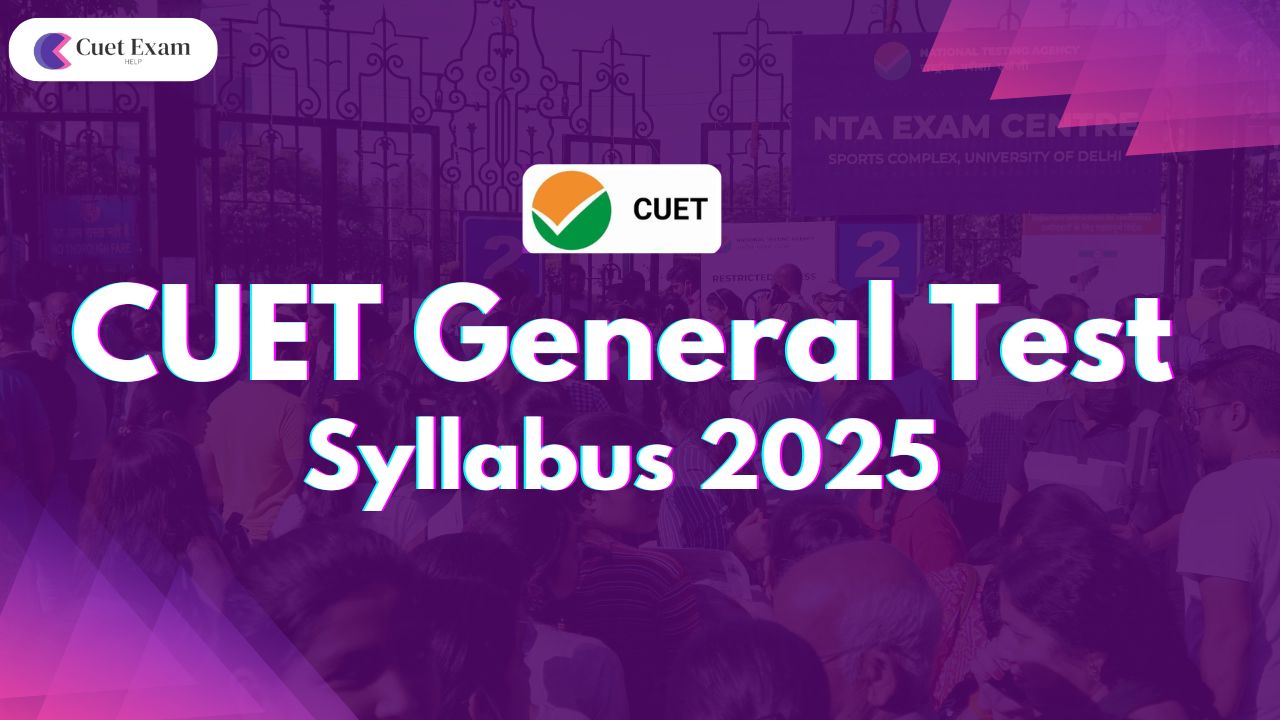CUET General Syllabus : Overview
CUET General Test Syllabus 2025 makes us to evaluate a wide variety including the array of knowledge and competencies which makes a necessitating thorough preparation across diverse subject areas. Below are the following detailed outlines of the CUET General Test syllabus to help aspirants in their own preparation :
CUET General Test 2025 : Syllabus
he CUET 2025 General Test offers an extensive evaluation of a candidate’s general knowledge and aptitude across diverse subjects. Below is a detailed overview of the syllabus to facilitate thorough preparation.Here is a detailed breakdown of the syllabus to facilitate through preparation.
General Knowledge and Current Affairs :
- Current Affairs : It contains all the major national and international events, recent developments, and all the significant updates in politics, economics, and social issues.
- Indian Polity and Governance: It contains the Constitution of India, political institutions, electoral systems, and all the existing key amendments.
- Indian History: It contains all the ancient, medieval and modern history, including significant events and influential leaders.
- Geography: It contains all the physical and human geography, key landforms, climate patterns, and all the geographical features of India and the world.
- Indian Economy: Economic principles, recent policies, budget highlights, and critical economic indicators.
- Science and Technology: Recent advancements, discoveries, and technological innovations.
- Sports: Major sports events, tournaments, achievements, and notable athletes.
- Culture and Arts: Major cultural events, festivals, prominent art forms, and influential figures in arts and culture.
- Awards and Honours: Prestigious awards, recent winners, and significant recognitions.
- Environment and Ecology: Environmental issues, conservation efforts, climate change, and ecological balance.

Reasoning Ability :
- Verbal Reasoning: Analogies, antonyms and synonyms, sentence completion, and reading comprehension.
- Logical Reasoning: Syllogisms, statements and conclusions, assumptions, and courses of action.
- Analytical Reasoning: Sequencing, series completion, puzzles, and blood relations.
- Mathematical Reasoning: Number series, data interpretation, and data sufficiency.
- Spatial Reasoning: Visualization of shapes, mirror images, and paper folding.
- Deductive Reasoning: Logical deduction and inference.
- Miscellaneous Reasoning: Direction sense, calendars, and clocks.
Quantitative Aptitude :
- Number Systems: Types of numbers, factors, multiples, and divisibility rules.
- Algebra: Linear and quadratic equations, polynomials, algebraic identities, and inequalities.
- Arithmetic: Percentages, profit and loss, simple and compound interest, ratio and proportion, and averages.
- Geometry: Properties of shapes, area, volume, perimeter, and coordinate geometry.
- Mensuration: Calculation of areas and volumes of geometric shapes.
- Data Interpretation: Analysis of data from tables, charts, and graphs.
- Statistics: Mean, median, mode, standard deviation, and variance.
- Probability: Basic concepts, permutations, combinations, and probability distributions.
- Speed, Distance, and Time: Problems involving speed, distance, time, and relative speed.
Must Read:
1: CUET English Most Important Topics 2025
2: Updated – CUET English Syllabus 2025
CUET General Test 2025 : Topic-wise Expected Questions
GK/Current Affairs Section :
- Current Affairs(National and International) : Covering major events, recent developments, political updates, and global happenings, with approximately 12-15 questions.
- Indian Polity and Governance : Focused on the Constitution of India, political institutions, major amendments, political parties, and electoral systems, with around 8-10 questions.
- Indian History : Encompassing ancient, medieval, and modern periods, including the freedom struggle, major historical events, and notable leaders, with approximately 8-10 questions.
- Geography : Covering physical geography (landforms, climate, natural resources), Indian geography (states, capitals, rivers, mountains), and world geography, with about 8-10 questions.
- Indian Economy : Focused on basic economic concepts, recent economic policies, budget highlights, and key economic indicators, with approximately 8-10 questions.
- Science and Technology : Covering recent scientific advancements, significant discoveries, technological innovations, and their applications, with about 5-8 questions.
- Sports : Including major events, tournaments, recent achievements, and notable personalities, with approximately 5-8 questions.
- Culture and Arts : Covering major cultural events, festivals, notable art forms, and prominent figures in the arts, with around 5-8 questions.
- Awards and Honours : Including prestigious awards (such as Nobel Prizes and national awards), recent winners, and significant recognitions, with about 5 questions.
- Environment and Ecology : Addressing environmental issues, conservation efforts, climate change, and ecological balance, with approximately 5 questions.
Reasoning Section :
- Verbal Reasoning : Analogy,Antonyms and Synonyms,Sentence Completion,Reading Comprehension having approximately 10-12 questions
- Logical Reasoning : Syllogism,Statements and Conclusions,Assumptions,Course of Action having approximately 8 – 10 questions
- Analytical Reasoning : Sequencing,Series Completion,Puzzles,Blood Relations having approximately 10 – 12 questions
- Mathematical Reasoning : Number Series,Data Interpretation,Data Sufficiency having approximately 8 – 10 questions
- Spatial Reasoning : Visualizing Shapes,Mirror Images,Paper Folding approximately 5 – 8 questions.
- Deduction Reasoning : Logical Deduction and Inference having approximately 5 – 8 questions.
- Miscallaneous Reasoning : Direction Sense,Calendars and Clocks having approximately 5 questions.
Quantitative Aptitude :
- Number Systems : Covering types of numbers (integers, fractions, decimals), factors, multiples, divisibility rules, and basic operations, with approximately 5-7 questions.
- Algebra : Including linear and quadratic equations, polynomials, algebraic identities, and inequalities, with around 8-10 questions.
- Arithmetic : Encompassing percentage, profit and loss, simple and compound interest, ratio and proportion, and averages, with approximately 10-12 questions.
- Arithmetic : Encompassing percentage, profit and loss, simple and compound interest, ratio and proportion, and averages, with approximately 10-12 questions.
- Geometric : Covering basic properties of shapes (triangles, circles, quadrilaterals), area, volume, perimeter, and coordinate geometry, with about 8-10 questions.
- Mensuration : Involving the calculation of areas and volumes for geometrical shapes such as cylinders, cones, spheres, and prisms, with approximately 5-7 questions.
- Data Interpretation : Analyzing and interpreting data from tables, charts, graphs, and pictograms, with around 8-10 questions.
- Statistics : Covering mean, median, mode, standard deviation, and variance, with approximately 5-7 questions.
- Probability : Including basic concepts, permutations, combinations, and probability distributions, with around 5-7 questions.
- Speed,Distance and Time : Addressing problems related to speed, distance, time, and relative speed, with approximately 5-7 questions.
CUET Offical Page GT Syllabus : Click Here
CUET General Test 2025 : Overall Preparation Tips
To excel in the CUET General Test, focus on the following tips :
- Stay Updated with Current Affairs : Stay updated with the news by continuously reading newspapers and follow the news which are coming in the latest updates by going through the magazines on the monthly basis to get a proper outline for new technologies,developments and events so that we can properly get engaged on that events by using those technologies on our daily basis as a habit.
- Focus on Weak Areas : Focus on weak areas by analysing the weaknesses which you are getting being you as an aspirant while practicing on a particular topic,unit-tests or mock-tests while practicing actually on the real timer basis and allocate additional time for targeted improvement to enhance your understanding and skills so that you can do better at the times when the final examination comes in your life.
- Practice Regularly : Practicing regularly and consistently by handling the questions on the sample papers and previous years’ papers to let the aspirants know about the exam pattern so that they can get the perfect knowledge on how to deal with the final exam and start enhancing the time management skills by sitting in the real environment zone so that you can get enough hint to deal with the examination at that moment.
- Use Quality Study Materials : Select highly endorsed textbooks and reference materials for CUET preparation, and leverage reputable online resources such as educational websites and video tutorials.
- Create a study plan : Craft a meticulously organized timetable that allocates time for each subject according to its complexity and your proficiency, and set specific, achievable goals for each session to monitor your progress effectively.
- Understand the Syllabus : Deeply familiarize yourself with the CUET 2025 syllabus to identify key topics and subtopics, and strategically allocate more time to high-weightage areas in your study plan.
- Strengthen Fundamentals : Ensure a robust understanding of core concepts across all subjects—reasoning, quantitative aptitude, and general knowledge—by employing conceptual study techniques to solidify and retain essential principles.
- Stay Healthy and Balanced : Adopt a well-rounded lifestyle by maintaining a nutritious diet, exercising consistently, and getting sufficient sleep, while managing stress through relaxation techniques and engaging in enjoyable activities.
- Join Study Groups : Participate in study groups or forums to discuss challenging topics and gain diverse perspectives, while fostering mutual support and motivation among peers.
- Regular Revision : Implement frequent revision sessions to consolidate your knowledge and enhance retention, and utilize summary notes and flashcards for rapid review of key concepts and formulas.
By implementing these preparation strategies, you can enhance your readiness for the CUET 2025 and increase your chances of achieving a high score. Stay disciplined, stay motivated, and approach your studies with a strategic mindset to excel in the examination.

